
views
- Repeat a positive mantra or affirmation to boost your self-esteem, such as "I am valuable and worthy."
- Make a list of your accomplishments and the things you like about yourself. Refer to that list any time you're feeling down for a quick boost.
- Avoid comparing yourself to others. You're on your own journey and you're moving at your own pace.
Encourage yourself with affirming thoughts.

Repeat a positive mantra in your mind to focus your thoughts. Positive mantras or positive affirmations are powerful phrases that can boost your confidence and self-esteem as well as help you move into better habits and thought patterns. An affirmation that resonates with you and speaks to the particular situation at hand works better than a random inspirational quote. For example, if you're about to give a big presentation and you're afraid you'll fail, you might tell yourself, "This presentation gives me an opportunity to share my knowledge and for that I am grateful." If you're about to go out on a first date and you're thinking the person won't like you, you might tell yourself, "I'm an interesting and intelligent person with a lot to offer. If that's not enough for this person, that's okay. There are plenty more fish in the sea." You could also try something more generic to apply to your whole day, such as "I am valuable and worthy," or "I am still learning so it's okay to make mistakes."
Celebrate the good things about you.
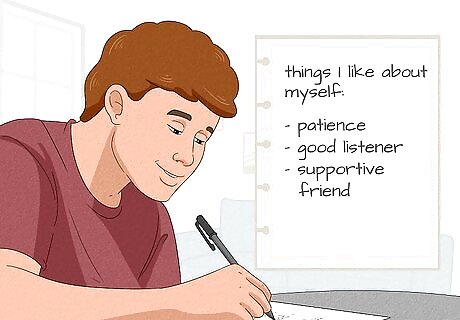
Write a list of things you like about yourself. Recognize the accomplishments you've made as well as your values and the qualities you have. This can be a slow process, but if you learn to appreciate what you have you'll start to feel better about yourself. For example, you might include things like your patience, that you're a good listener, that you work well with kids, and that you're a supportive friend. Whenever you're feeling down or bad about yourself, refer to your list. You'll likely find something that will make you smile and see your inner goodness. When you accomplish something, no matter how small, take the time to notice it and pat yourself on the back for it.
Keep your focus on yourself.

Avoid comparing yourself to others. You're not in a competition with anybody but yourself! Judge your accomplishments and your progress only by what you've done before, not by what other people have done. Remember that you're not in a race either. It can be easy to get down on yourself if someone else accomplishes something before you do, but that doesn't mean you won't do it or that they're better than you.
Try something new.
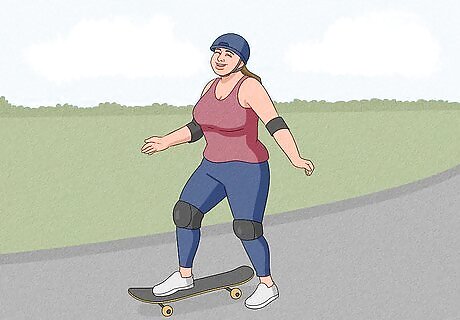
Go out of your comfort zone and give yourself permission to fail. Often, the fear of failure will stop you from ever trying anything new. But when you don't try new things and push yourself in different directions, you don't grow. Accept the mistakes you make and tell yourself that they're just part of the process of growing and improving as a person. Remember that nobody is perfect and it's unreasonable to think you'll do something perfectly on your first try. Making mistakes is how you learn.
Challenge unkind thoughts about yourself.

Replace negative thoughts with positive ones for a quick boost. This might not be easy at first, but after making a conscious effort a few times, it will become a habit. The important thing to remember is that you won't improve your overall self-esteem very much if you still have those negative thoughts about yourself rattling around in your head. But if you eliminate them and replace them with positive thoughts, it'll make a tremendous difference in how you perceive yourself. For example, suppose you think, "I made a bad grade on that test, I'm never going to pass this class." Ask yourself what evidence you have to support that statement. Then look for something positive you can replace it with. For example, you might instead think, "I made a bad grade on that test but it's not the end of the world. I'll sign up for tutoring and ask the teacher if there's any extra credit work I can do to get my grade up."
Set boundaries with other people.

Practice saying "no" and being more assertive. People with low self-esteem often feel as though they can't tell people "no" for fear of displeasing them. But setting healthy boundaries and telling people "no" when you can't or don't want to do something is an act of self-care. And the more you care for yourself and treat yourself gently, the more your self-esteem will improve. Setting boundaries also shows mutual respect. If there are people in your life who aren't willing to respect the boundaries you set, distance yourself from them. Problems setting boundaries are often long-standing habits that are difficult to break on your own. Talk to a therapist or counselor if you need help setting boundaries.
Build a support network around you.

Cultivate positive relationships with kind, supportive people. Take friends or family members you trust to the side and ask them to help you with your self-esteem. Be sure to tell them that you know they're busy and you appreciate their help. In many cases, people consider it a compliment when they're asked to help this way. For example, you might ask your friends to list some things that they like about you. That can help you understand what value you bring to their lives. You might also ask them to tell you some things you should be proud of, or things they're proud of you for accomplishing. Sometimes, something you didn't even consider an accomplishment is something someone else is really proud of you for! Keep in mind that it can be really hard to boost your self-esteem on your own. Talking to a friend who will give you positive feedback can help you challenge and reframe your negative thinking.
Set challenges for yourself.
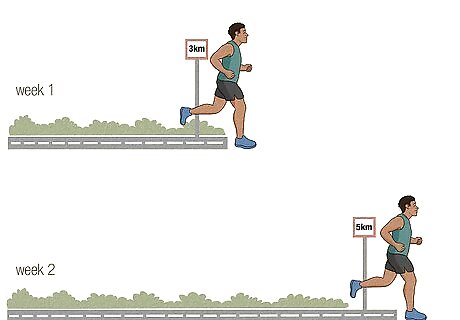
Use small, realistic goals to make continuous progress. Pick one thing you want to accomplish and figure out baby steps you can take to reach that ultimate goal. Turn each step into a SMART goal: Specific, Measurable, Achievable, Relevant, and Time-bound. Focus on your effort and try to make a little bit of progress toward your goal every day. For example, if your goal is to write a novel, you might set a measurable limit for the number of words you want to write each day, with the ultimate intent of finishing your draft by the end of the year. Record the number of words you actually write each day to track your progress. Journal about your goals and chart your progress. If you slip up or don't get as far as you originally planned, no worries! It's all part of the process. Growth isn't always linear. Just keep going and you'll get there.
Make time for your hobbies and interests.
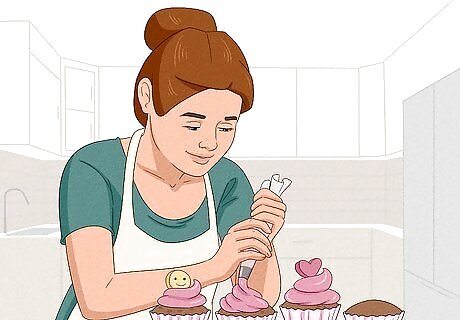
Indulge in activities that you find fun and entertaining. It's much easier for you to think positive thoughts when you're doing something you enjoy. At the same time, doing something you enjoy will make you feel happy and probably pretty good about yourself—and that's definitely a good thing if you're trying to improve your self-esteem. Don't think about these things as things you're only allowed as a reward for doing something else. Carve out a little time every day for the things that help you recharge and feel good about yourself.
Get to know yourself better through journaling.

Reflect on your thoughts and feelings to feel better about yourself. Journaling can help you figure out exactly what you're thinking or feeling about developments in your life so you can find solutions to problems and make your way forward. When you read back on your journal entries, you'll be able to see the progress you've made toward your goals and toward improving your life. Write about things that trigger a blow to your self-esteem specifically. Think about different ways you could handle the situation or different ways you could think about it that wouldn't affect your self-esteem so badly. For example, you might write about a situation in which you got criticism at work and it made you feel like you were a terrible employee and they were going to fire you. Reflecting on that thought, you could write a list of all the ways in which you're valuable in your job.
Volunteer in your community.

Help yourself by helping others. People typically get a spike of dopamine when they help others, so helping others will help you feel better about yourself, especially if you're volunteering for something you consider worthwhile. If you feel like you're actually making a difference in your community and people appreciate your help, it can potentially improve your self-esteem. For example, if you love animals, you might volunteer to walk dogs or play with cats at your local animal shelter. You can also volunteer at food banks or homeless shelters. Your local community center might have other opportunities as well, such as tutoring or volunteering for an after-school program.
Look after your body and your health.

Eat healthy foods and stay active to feel better about yourself. Exercise produces hormones that can improve your outlook and state of mind and make you feel happier. Getting plenty of sleep and eating well will also help you feel better about yourself. Generally speaking, when you take care of yourself, you're more likely to have a positive opinion of yourself and your value. Yoga or progressive muscle relaxation techniques can help you better accept your body and feel better about yourself, which could also boost your self-esteem.
Identify triggers that lower your self-esteem.

Pinpoint these situations so you can change the way you react. It's usually an accumulation of different events or situations that make you start thinking poorly of yourself. If you can figure out what those things are, you'll be better able to rewrite the narrative about yourself so you can improve your self-esteem. For example, you may have struggled in math class and now believe that you're terrible at math and not very smart. But you can tell yourself that your performance in a single class doesn't have anything to do with your overall intelligence. Often your triggers come from childhood. For example, people who suffered abuse as a child may have developed low self-esteem as a defense mechanism because they would be potentially targeted for abuse if they displayed confidence in themselves.
Practice mindfulness to improve your outlook.
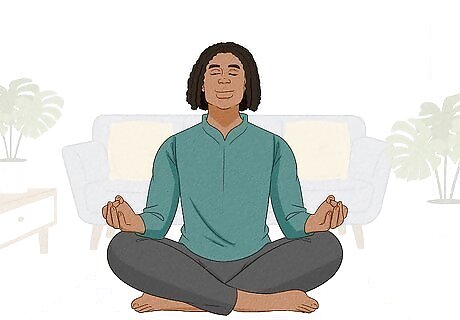
Live in the moment to lower your anxiety and stress levels. Work on your mindfulness through meditation or other practices. By enhancing mindfulness in your life, you'll find it easier to respond to experiences in your life, act with awareness, and be less judgmental about yourself. When it comes to practicing mindfulness, you might want to try several different techniques to find what works best for you. Yoga helps many people increase their mindfulness. For others, a meditative walk in nature helps their mental outlook considerably.
Talk to a therapist.

Reach out to a professional if you're still struggling. Chronic problems with self-esteem won't change overnight and sometimes these issues are more than you can handle on your own. Realize that there's no shame in seeking help if you need it. A counselor or therapist can provide you with tools and resources that will help you reframe your thinking and look at yourself more positively. Group therapy can also help. If you're able to connect with other people who have similar self-esteem issues or similar triggers, it can help you feel more understood and less alone.














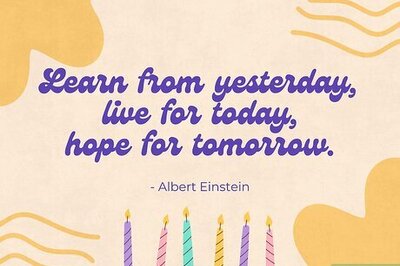




Comments
0 comment